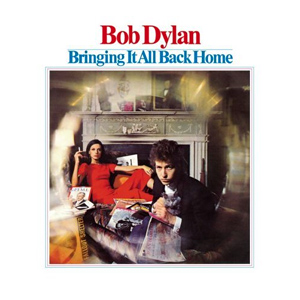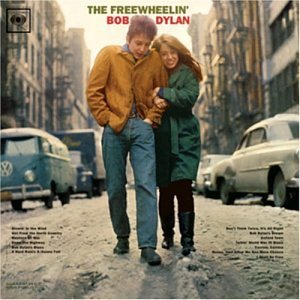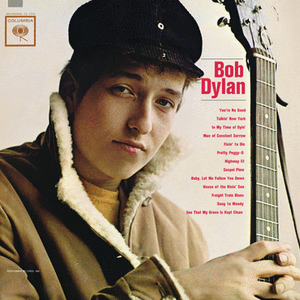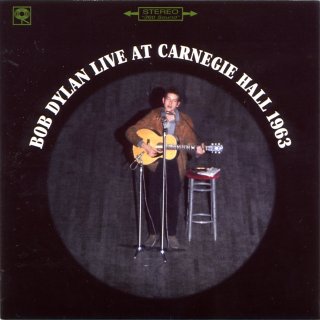Related Research Articles

Bringing It All Back Home is the fifth studio album by the American singer-songwriter Bob Dylan, released in April 1965 by Columbia Records. In a major transition from his earlier sound, it was Dylan's first album to incorporate electric instrumentation, which caused controversy and divided many in the contemporary folk scene.

The Freewheelin' Bob Dylan is the second studio album by the American singer-songwriter Bob Dylan, released on May 27, 1963, by Columbia Records. Whereas his self-titled debut album Bob Dylan had contained only two original songs, this album represented the beginning of Dylan's writing contemporary lyrics to traditional melodies. Eleven of the thirteen songs on the album are Dylan's original compositions. It opens with "Blowin' in the Wind", which became an anthem of the 1960s, and an international hit for folk trio Peter, Paul and Mary soon after the release of the album. The album featured several other songs which came to be regarded as among Dylan's best compositions and classics of the 1960s folk scene: "Girl from the North Country", "Masters of War", "A Hard Rain's a-Gonna Fall" and "Don't Think Twice, It's All Right".

Bob Dylan is the debut studio album by the American singer-songwriter Bob Dylan, released on March 19, 1962, by Columbia Records. The album was produced by Columbia talent scout John H. Hammond, who had earlier signed Dylan to the label, a controversial decision at the time. The album primarily features folk standards but also includes two original compositions, "Talkin' New York" and "Song to Woody". The latter was an ode to Woody Guthrie, a significant influence in Dylan's early career.

The Times They Are a-Changin' is the third studio album by the American singer-songwriter Bob Dylan. It was released on February 10, 1964, through Columbia Records. Whereas his previous albums, Bob Dylan (1962) and The Freewheelin' Bob Dylan (1963), combined original material and cover songs, this was the first to feature only original compositions. The album consists mostly of stark, sparsely arranged ballads concerning issues such as racism, poverty, and social change. The title track is one of Dylan's most famous; many feel that it captures the spirit of social and political upheaval that characterized the 1960s.
"Masters of War" is a song by Bob Dylan, written over the winter of 1962–63 and released on the album The Freewheelin' Bob Dylan in the spring of 1963. The song's melody was adapted from the traditional "Nottamun Town." Dylan's lyrics are a protest against the Cold War nuclear arms build-up of the early 1960s.

Bob Dylan is an American singer-songwriter. Considered one of the greatest songwriters of all time, Dylan has been a major figure in popular culture over his 60-year career. With an estimated figure of more than 125 million records sold worldwide, he is one of the best-selling musicians of all-time. Dylan added increasingly sophisticated lyrical techniques to the folk music of the early 1960s, infusing it "with the intellectualism of classic literature and poetry". His lyrics incorporated political, social and philosophical influences, defying pop music conventions and appealing to the burgeoning counterculture.
"Bob Dylan's Dream" is a song written by Bob Dylan in 1963. It was recorded by Dylan on April 24, 1963, and was released by Columbia Records a month later on the album The Freewheelin' Bob Dylan.
"Talkin' New York" is the second song on Bob Dylan's eponymous first album, released in 1962. A talking blues, the song describes his feelings on arriving in New York City from Minnesota, his time playing coffee houses in Greenwich Village, and his life as a folksinger without a record deal. The lyrics express the apparent difficulty he had finding gigs as a result of his unique sound, with a character in the song telling Dylan: "You sound like a hillbilly; We want folk singers here."

Live at Carnegie Hall 1963 is a six-song live set by Bob Dylan. It was released as an EP by Columbia Records in 2005. The songs were recorded on October 26, 1963 at Carnegie Hall in New York City.
"Let Me Die in My Footsteps" is a song written by American singer-songwriter Bob Dylan in February 1962. The song was selected for the original sequence of Dylan's 1963 album The Freewheelin' Bob Dylan, but was replaced by "A Hard Rain's a-Gonna Fall". This version was recorded at Columbia studios on April 25, 1962, during the first Freewheelin' session, and was subsequently released in March 1991 on The Bootleg Series Volumes 1–3 1961–1991.
"Oxford Town" is a song written by American singer-songwriter Bob Dylan in 1962. It was recorded in Columbia's Studio A on December 6, 1962, for his second album, The Freewheelin' Bob Dylan.
Bob Dylan bootleg recordings are unreleased performances by American singer-songwriter Bob Dylan, that have been circulated throughout the public without undergoing an official, sanctioned release. It is commonly misconceived that bootlegs are only restricted to audio, but bootleg video performances, such as Dylan's 1966 film Eat the Document, which remains officially unreleased, are considered to be bootlegs. Dylan is generally considered to be the most bootlegged artist in rock history, rivaled only by the Grateful Dead.
"Talkin' John Birch Paranoid Blues", also known as "Talkin' John Birch Society Blues" and "Talkin' John Birch Blues", is a protest song and talking blues song written by singer-songwriter Bob Dylan in 1962. It is a satirical song, in which a paranoid narrator is convinced that communists, or "Reds" as he calls them, are infiltrating the country. He joins the John Birch Society, an anti-communist group, and begins searching for Reds everywhere. The narrator decries Betsy Ross as a communist and four U.S. Presidents as Russian spies, while lauding Adolf Hitler and George Lincoln Rockwell. After exhausting the possibilities of new places to find communists, he begins to investigate himself.

The Bootleg Series Vol. 9: The Witmark Demos: 1962–1964 is a compilation album by American singer-songwriter Bob Dylan, containing demo recordings he made for his first two publishing companies, Leeds Music and M. Witmark & Sons, from 1962 to 1964. The seventh installment of the ongoing Bob Dylan Bootleg Series, it was released on October 19, 2010 on Legacy Records.
"John Brown" is a song by American singer-songwriter Bob Dylan. The song, written in October 1962 was released under his pseudonym "Blind Boy Grunt" on the Folkways Records compilation album Broadside Ballads, Vol. 1 (1963). Live performances have been officially released on MTV Unplugged (1995), Live at The Gaslight 1962 (2005), and Live 1962–1966 – Rare Performances From The Copyright Collections (2018). A demo version was issued on The Bootleg Series Vol. 9 – The Witmark Demos: 1962–1964 (2010).
"Farewell", also known as "Fare Thee Well", is a song by American singer-songwriter Bob Dylan. Dylan wrote the song in January 1963. He considered it for his third album, The Times They Are a-Changin', but only attempted a few takes during the album's first studio session. Dylan's earlier recordings of "Farewell" found their way onto various bootlegs, and a collection of demos that included the song was released in October 2010 as The Bootleg Series Vol. 9 – The Witmark Demos: 1962–1964.
"Mama, You Been on My Mind" is a song by American singer-songwriter Bob Dylan. Written in 1964 during a trip to Europe, the song dealt with his recent breakup with his girlfriend, Suze Rotolo. Dylan first recorded the song in June of that year during a session for his album Another Side of Bob Dylan. However, the song was not included on the album, and Dylan's version remained unreleased until 1991. In total, in the 1990s and 2000s four versions were put out on Dylan's Bootleg Series of releases, including two live performances with Joan Baez from 1964 and 1975.
Bob Dylan is an American musician, singer-songwriter, music producer, artist, and writer. He has been an influential figure in popular music and culture for more than five decades. Much of his most celebrated work dates from the 1960s when he was an informal chronicler and a seemingly reluctant figurehead of social unrest.
"I Shall Be Free" is a song by American singer-songwriter Bob Dylan. It was recorded on 6 December 1962 at Studio A, Columbia Recording Studios, New York, produced by John Hammond. The song was released as the closing track on The Freewheelin' Bob Dylan on 27 May 1963, and has been viewed as a comedic counterpoint to the album's more serious material. Dylan has never performed the song in concert.
"You're No Good" is a song by Jesse Fuller that appeared as the opening track on Bob Dylan's eponymous debut album (1962). Eight takes were recorded by Dylan on November 20, 1961. He learnt the song directly from Fuller in Denver; Fuller's own recorded version was not released until May 13, 1963, on his album San Francisco Bay Blues. The song concerns the narrator's difficult relationship with a woman, and concludes with the narrator wanting to "lay down and die". Dylan's version is more uptempo than Fuller's, and has some changes to the lyrics; it has been positively reviewed by critics.
References
- 1 2 3 4 Margotin, Philippe; Guesdon, Jean-Michel (2015). Bob Dylan All the Songs: The Story Behind Every Track. Black Dog and Leventhal Publishers. p. 76. ISBN 978-1579129859.
- 1 2 3 4 5 6 7 8 9 Trager, Oliver (2004). Keys to the Rain: The Definitive Bob Dylan Encyclopedia. New York: Billboard Books. pp. 598–599. ISBN 0823079740.
- 1 2 3 Sounes, Howard (2011). Down the Highway: The Life of Bob Dylan. New York: Grove Press. pp. 98–99. ISBN 9780802145529.
- 1 2 3 Heylin, Clinton (1995). Revolution in the Air: The Songs of Bob Dylan, 1957–73. Constable & Robinson. pp. 58–59. ISBN 9781849012966.
- ↑ Mastropolo, Frank (September 29, 2017). "Musicians Recall Dylan's First Big Gig and 25 Years of Music History at Gerde's Folk City". bedfordandbowery.com. Archived from the original on November 16, 2020. Retrieved May 14, 2021.
- ↑ Gray, Michael (2008). The Bob Dylan Encyclopedia. London: Continuum International Publishing Group. pp. 294–295. ISBN 9780826429742.
- ↑ Williams, Paul (2004). Bob Dylan, performing artist: the early years, 1960–1973. London: Omnibus Press. p. 18. ISBN 1844490955.
- 1 2 Heylin, Clinton (1995). Dylan: Behind Closed Doors – the Recording Sessions (1960–1994). Penguin Books. pp. 7–18. ISBN 978-0140257496.
- 1 2 Heylin, Clinton (2021). The Double Life of Bob Dylan. Vol. 1 1941–1966, A restless, hungry feeling. London: Bodley Head. p. 128. ISBN 9781847925886.
- ↑ Greene, Andy (May 11, 2021). "Clinton Heylin Wrote Eight Bob Dylan Books. Then He Realized He Needed to Start All Over". Rolling Stone . Archived from the original on May 13, 2021. Retrieved May 14, 2021.
- 1 2 "Still on the road: 1962 concerts and recording sessions". Olof Björner website. Archived from the original on November 20, 2010. Retrieved May 14, 2021.
- 1 2 Filcman, Debra (April 10, 2011). "Long-forgotten recording of Bob Dylan's Brandeis folk festival performance to be released". Brandeis University. Archived from the original on May 4, 2021. Retrieved May 15, 2021.
- ↑ Marshall, Evan. "The 1964 talkin' public domain blues". Record Collector. No. 415. Metropolis International Group Ltd.
- ↑ Greene, Andy (April 28, 2011). "Bob Dylan in Concert: Brandeis University 1963". Rolling Stone . Archived from the original on September 21, 2020. Retrieved May 14, 2021.
- ↑ Underwood, Richard H. (October 2011). "When the law doesn't work". Fordham Urban Law Journal. 38 (55): 1495+.
- ↑ Gettelman, Parry (April 19, 1991). "Bob Dylan". The Orlando Sentinel. p. 96.
- ↑ Robins, Wayne (March 24, 1991). "Bob Dylan revisited: bootlegs and out-takes". Newsday. Melville, New York. p. 105.
- ↑ Considine, J.D. (March 31, 1991). "Dylan's history in the making". Sunday News. Kenosha, Wisconsin. p. 15.
- ↑ Atkinson, Terry (April 20, 1991). "Bootleg Dylan CD contains real gems". Red Deer Advocate. p. 22.
- ↑ Rasmussen, Eric (April 4, 1991). "Group of Dylan 'rejects' makes excellent collection". The Capital Times. Madison, Wisconsin. pp. 1D, 8D.